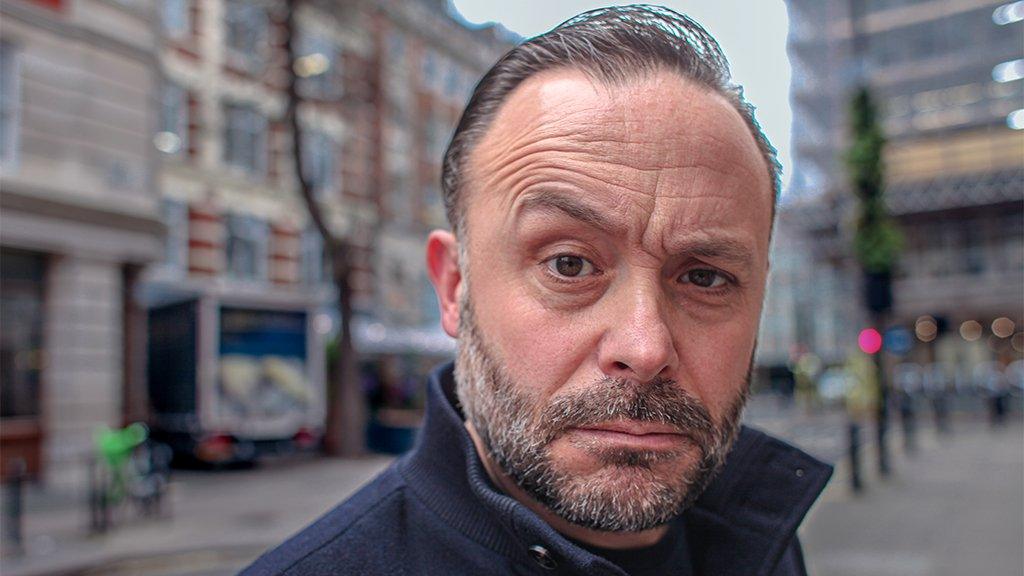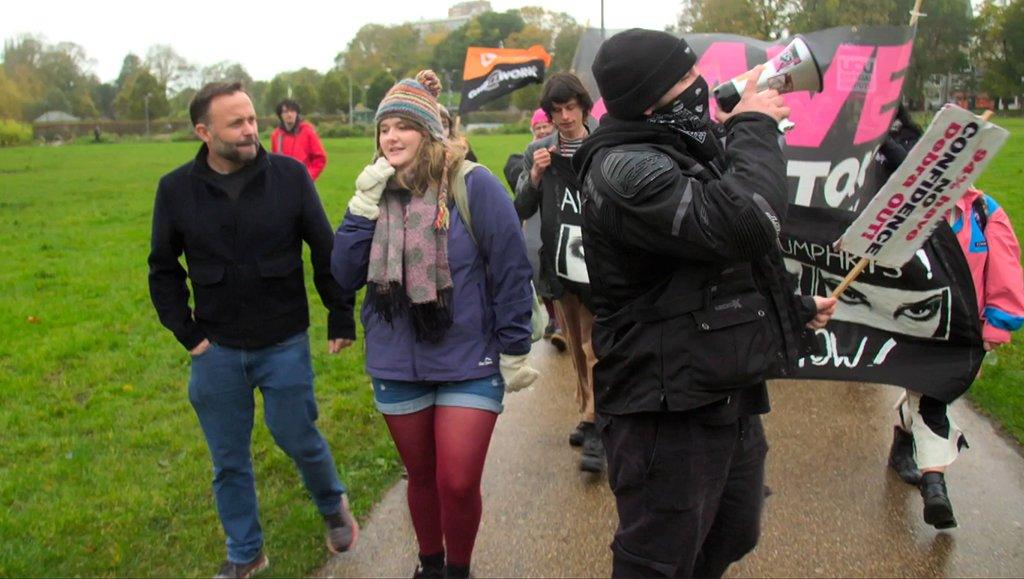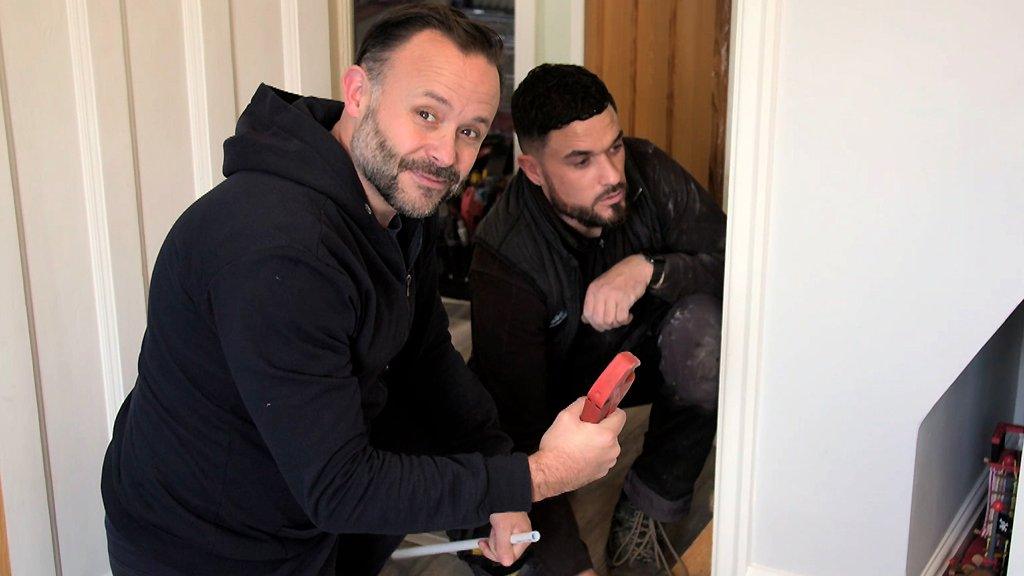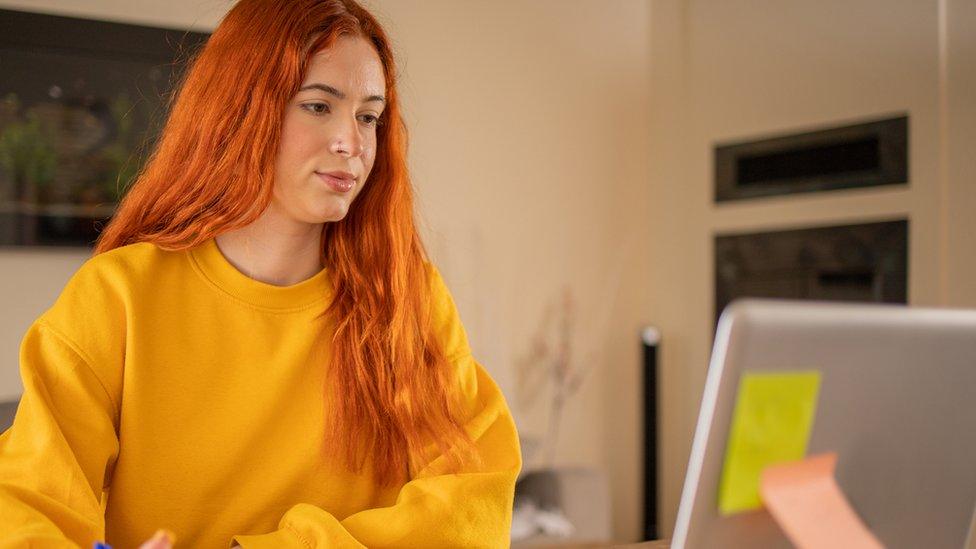Geoff Norcott: Should my son bother going to uni?
- Published

Comedian and former teacher Geoff Norcott wonders if he should encourage his son to go to university or learn a trade instead.
Students today contend with tuition fees, the rising cost of living and can't always breeze into well-paid graduate jobs.
Geoff travelled around the country for a BBC Two documentary to find out if university is worth all the time and money.

In 1998, I graduated with a 2:1 in English Literature from Goldsmiths College in London. My mum, who'd been brought up in care and was struggling to pay the bills on our council property, sat wiping away tears as I collected that coveted scroll.
So why is it that, only one generation on, I'm highly sceptical as to whether a university education would be the right thing for my son?
It's surprising I now feel this way, considering I was a teacher during the early noughties and fully invested in Tony Blair's idea of encouraging every living thing to get a degree. He talked about "higher standards for all" and wanting 50% of young people to go to uni. Governments since then have also continued on that road.

Geoff graduated in 1998
Blair declared education to be his top three priorities. At the time, I'd have suggested they should've also formed numbers four, five and six and been tattooed on his forearm. So where has my antipathy (and I'm not alone) towards degrees and universities suddenly come from?
On one level, it's a consequence of knowing degrees have become much more common. UK graduate levels have risen from around 4% in the early 1960s to nearly 40% today (according to the House of Commons Library, external).
Scarcity has value, we all know why diamonds cost more than pebbles.
I met a vice chancellor who countered this, informing me that dynamic, developed countries aim even higher than the UK's current rates.
Maybe, as someone who's learned his job telling jokes to rowdy stags and hens, I'm naturally dubious about the need for formal qualifications. But the feeling persists that, where once a degree would guarantee a good job, now it has become an expensive entry requirement to any job at all.

Is University Really Worth It?
Comedian and former teacher Geoff Norcott has a tough decision to make - start a university fund for his son to follow in his footsteps and attend university or buy himself a new car.

There's a strong argument for following a subject you're passionate about and experiencing uni life, but it's hard to get past the hugely increased cost. In 1998, Labour introduced "top-up" tuition fees of £1,000 across the UK (they were abolished in Scotland shortly afterwards).
The annual charges rose through the early noughties, but the biggest jump to £9,000 was in 2012 under the coalition government.
The current rate is a little higher - it can be up to £9,250. A huge difference to the free education I enjoyed - in my day tuition was free and you could apply for financial help with your living expenses.
You could argue that by injecting cash into the system, the fees helped raise the standard of university teaching and facilities. Or it could be more proof, if it were needed, that things have got generally worse for students since the mid-90s and the release of Now That's What I Call Music 37.
Additionally, most students in the UK have to take out eye-watering maintenance loans, which haven't kept pace with the recent cost-of-living crisis. So, since I went to uni, the overall cost of getting a degree has gone up while, some perceive, its value has gone down.
According to a YouGov poll in 2022, a staggering 69% of graduates, in England and Wales, felt their degree wasn't worth it.
Of course this is only one survey, but I don't need a PHD in business studies to tell me these metrics are moving in the wrong direction.
In recent years students have been particularly unlucky, losing a huge part of their face-to-face education to a pandemic and long-running strikes. In one 14-day staff walkout an estimated 575,000 teaching hours were lost, external.
Some students sympathise with the claims of lecturers and their unions, that staff are not paid enough and sometimes have to work zero-hours contracts. But it's often young people, already paying huge sums for an education, who end up as collateral.

Geoff with some students protesting in Brighton
During the pandemic, many universities had to teach their students remotely and in-person lectures did not return for some time. It can't feel like value for money when your lecturer starts buffering halfway through a class.
My fears that the general value of degrees are sliding hasn't been helped by the phenomenon of "grade inflation".
The rate of students getting firsts across the UK almost doubled between 2010 and 2020, figures from the Office for Students, external suggest.
It would be lovely to believe our brightest students have become twice as intelligent, but I also wonder if the "businessification" of higher education, where some might argue students are regarded as customers, puts more pressure on the universities to give them what they want.
One lecturer, who wanted to remain anonymous, told me in the programme that they had been told several times in different ways "don't fail any students this year".
I wonder, if I was at uni today, I may well look at a 2:2 and respond like a coercive mob boss. "A two-two you say? Well I've got 50 grand here which says otherwise."
Grade inflation has started to fall slightly in recent years - and universities say they are beginning to tackle the issue. They are also helping to bolster local economies, one councillor told me, with the sheer numbers of students and support staff on campuses - plus university research projects helping to start new businesses.
The stats still suggest graduates will benefit from a net-financial gain across their career, but that's an average which skews heavily towards certain universities and professions.
Indeed, a male doing creative arts is likely to earn more by starting work straight from school (which poses difficult questions about all that time I spent trying to decipher James Joyce).
There are other ways of making money. Of my childhood friends, many of the wealthiest now have their name on the side of a van. Maybe trades should be the way forward?
It's a hunch I got to stress-test when I spent the day with some chirpy, aspirational plumbers from Hull. They take on apprentices straight from school and teach them skills on the job - the new starters even get paid.

Geoff joined plumbers in Hull for the day
I ended up wondering if I should go even harder influencing my son to join their profession, or start putting the Super Mario movie on repeat in the hope he becomes a plumber, or at the very least starts eating more mushrooms.
In a world where AI seems capable of doing most things, it may be that plumbing is the one job technology could never supersede (computers would be hard pushed to understand the irrational nature of a leak in a Victorian semi or the bodge-jobs successive generations of dads have inflicted along the way).
While the university experience will always have value - and degrees will remain the obvious choice for certain professions - maybe it's time to strip away sentiment and ask whether we're advising young people to apply because it's the right option for them, or because we like the idea of them striding across that stage and holding that piece of paper.
The photo will always look great, but the value of the scroll they're holding might have changed more than we like to admit.
